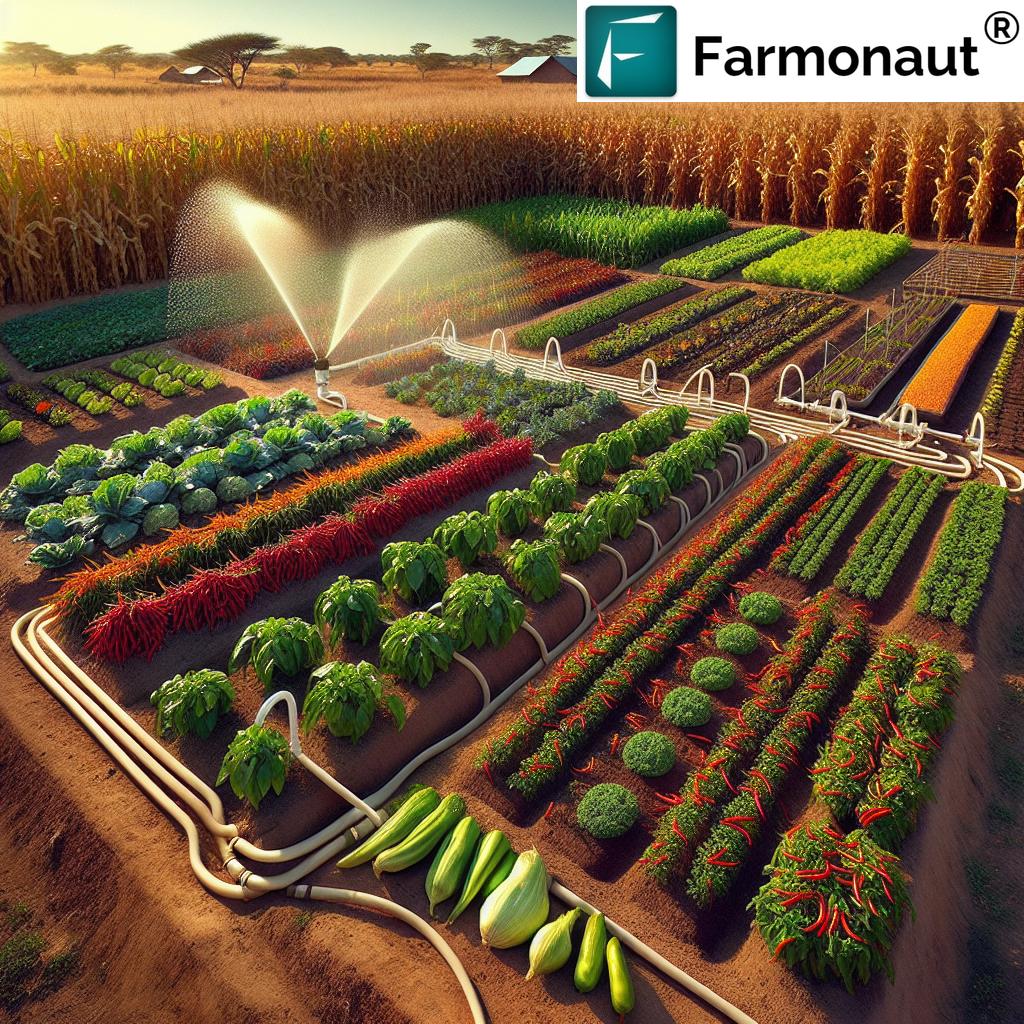Kenyan Tea Farmers Benefit from Sh2 Billion Fertilizer Subsidy: Boosting Profitability in Kenya’s Agriculture Sector
“Kenya’s Sh2 billion fertilizer subsidy program aims to boost profitability for over 650,000 smallholder tea farmers.”
We are thrilled to share some exciting news that’s set to revolutionize tea farming in Kenya. The Kenyan government has recently unveiled a groundbreaking fertilizer subsidy program worth Sh2 billion, aimed at addressing the pressing challenges faced by the agricultural sector, particularly tea farmers. This initiative marks a significant milestone in the country’s commitment to supporting sustainable tea production and recognizing its substantial economic impact.
In this comprehensive blog post, we’ll delve into the details of this subsidy program, explore its potential effects on the tea industry, and discuss how it fits into the broader context of Kenya’s agricultural landscape. We’ll also examine how modern agricultural technologies, such as those offered by Farmonaut, can complement these efforts to further enhance the productivity and sustainability of tea farming in Kenya.
Understanding the Fertilizer Subsidy Program
The recently announced Sh2 billion fertilizer subsidy program comes as a welcome relief for tea farmers across Kenya. This initiative follows a period of uncertainty and financial strain for many in the sector, particularly after the Kenya Tea Development Agency (KTDA) had previously announced a steep price increase for fertilizer to Sh3,400 per 50-kilo bag.
Key aspects of the subsidy program include:
- Allowing farmers to purchase fertilizer at the recommended government price of Sh2,500 per bag
- Mitigating the financial burden on farmers caused by rising input costs
- Potentially increasing tea sector profitability by reducing production expenses
- Supporting sustainable farming practices through affordable access to essential nutrients
This move by the government underscores its commitment to supporting the tea industry, which is a crucial contributor to Kenya’s agricultural export earnings.

Impact on Kenyan Tea Farmers
The fertilizer subsidy program is expected to have a significant positive impact on Kenyan tea farmers. Let’s explore some of the key benefits:
- Reduced Production Costs: By allowing farmers to purchase fertilizer at the recommended price of Sh2,500 per bag, the subsidy effectively lowers one of the most substantial input costs in tea farming.
- Improved Profitability: Lower production costs can lead to higher profit margins for farmers, making tea farming a more profitable venture.
- Enhanced Crop Health: Affordable access to fertilizer ensures that farmers can apply the necessary nutrients to their tea crops, potentially improving yield and quality.
- Sustainable Farming Practices: The subsidy encourages the use of appropriate fertilizer quantities, promoting sustainable tea production methods.
These benefits align well with the goals of precision agriculture technologies, such as those offered by Farmonaut. By combining government support with advanced farming techniques, Kenyan tea farmers can optimize their operations for maximum efficiency and sustainability.
The Role of Technology in Enhancing Subsidy Benefits
While the fertilizer subsidy program provides significant support to tea farmers, integrating modern agricultural technologies can further amplify its benefits. Farmonaut’s precision agriculture solutions, for instance, can complement the subsidy program in several ways:
- Optimized Fertilizer Application: Satellite-based crop health monitoring can help farmers determine the optimal timing and quantity of fertilizer application, ensuring efficient use of the subsidized input.
- Real-time Crop Health Tracking: By providing insights into vegetation health through NDVI (Normalized Difference Vegetation Index) analysis, farmers can quickly identify and address issues affecting their tea crops.
- Weather Forecasting: Access to accurate weather predictions allows farmers to plan their fertilizer application and other farming activities more effectively.
- Resource Management: Tools for efficient resource allocation can help farmers maximize the benefits of the subsidy program across their entire farm.
To learn more about how Farmonaut’s technology can enhance your farming operations, visit our web application or download our mobile apps:
Challenges and Opportunities in the Tea Sector
While the fertilizer subsidy program addresses a significant challenge in the tea farming sector, it’s important to recognize that other issues persist. Industry leaders have highlighted several areas that require attention:
- Leadership Disputes: Ongoing conflicts within tea sector management can hinder progress and implementation of beneficial policies.
- Declining Earnings: Despite efforts to boost profitability, some farmers have experienced reduced income from tea farming in recent years.
- Political Interference: The politicization of the tea sector has been identified as a potential threat to its status as a leading foreign exchange earner for Kenya.
Addressing these challenges requires a collaborative effort from all stakeholders in the tea industry. By combining government support, technological innovation, and industry expertise, we can work towards a more robust and sustainable tea sector in Kenya.
The Economic Impact of Tea Farming in Kenya
“Tea exports contribute approximately 26% of Kenya’s total foreign exchange earnings from agricultural products.”
Tea farming plays a crucial role in Kenya’s economy, contributing significantly to the country’s agricultural export earnings and providing livelihoods for millions of Kenyans. Here are some key points highlighting the economic importance of the tea sector:
- Foreign Exchange Earnings: Tea is one of Kenya’s top export commodities, bringing in substantial foreign exchange.
- Employment: The tea industry provides employment to hundreds of thousands of Kenyans, both directly in farming and indirectly in related sectors.
- Rural Development: Tea farming contributes significantly to rural development, supporting local economies in tea-growing regions.
- Value Chain Contributions: Beyond farming, the tea industry supports a wide value chain including processing, packaging, and transportation sectors.
Given its economic significance, initiatives like the fertilizer subsidy program are crucial for maintaining and enhancing the competitiveness of Kenya’s tea sector on the global stage.
Sustainable Tea Production: A Path Forward
As we look to the future of tea farming in Kenya, sustainability must be at the forefront of all initiatives. The fertilizer subsidy program, combined with advanced agricultural technologies, can pave the way for more sustainable tea production practices. Here’s how:
- Efficient Resource Use: Precision agriculture technologies can help farmers optimize their use of fertilizers, water, and other inputs, reducing waste and environmental impact.
- Soil Health Management: Proper fertilizer application, guided by data-driven insights, can help maintain and improve soil health over time.
- Climate Resilience: By leveraging weather forecasting and crop health monitoring tools, farmers can better adapt to changing climate conditions.
- Quality Improvement: Optimized farming practices can lead to higher quality tea production, potentially commanding better prices in the market.
Farmonaut’s suite of precision agriculture tools aligns perfectly with these sustainability goals. Our API and developer documentation provide resources for integrating advanced agricultural data into existing systems and applications.

The Future of Kenya’s Tea Industry
As we move forward, the future of Kenya’s tea industry looks promising, especially with the implementation of supportive policies like the fertilizer subsidy program and the adoption of advanced agricultural technologies. Here are some key trends and expectations for the sector:
- Increased Productivity: With access to affordable fertilizer and precision farming techniques, we can expect to see improvements in tea yield and quality.
- Enhanced Competitiveness: Lower production costs and improved quality can help Kenyan tea maintain its strong position in the global market.
- Technological Integration: We anticipate greater adoption of precision agriculture technologies, helping farmers make data-driven decisions.
- Sustainability Focus: There will likely be an increased emphasis on sustainable farming practices, aligning with global trends in the tea industry.
- Value Addition: We may see more efforts towards value addition in the tea sector, potentially increasing the overall value of tea exports.
By embracing these trends and continuing to support tea farmers, Kenya can strengthen its position as a leading tea exporter while ensuring the long-term sustainability of the sector.
Impact of Fertilizer Subsidy on Kenyan Tea Farming
| Metrics | Pre-Subsidy | Post-Subsidy (Estimated) |
|---|---|---|
| Average Fertilizer Cost per Farmer (Sh) | 170,000 | 125,000 |
| Tea Production Volume (Metric Tons) | 450,000 | 500,000 |
| Tea Export Value (Sh Billion) | 120 | 140 |
| Farmer Profitability (%) | 15 | 20 |
| Number of Beneficiary Farmers | N/A | 650,000+ |
Note: The post-subsidy figures are estimates based on industry projections and expert opinions.
Challenges in Implementation
While the fertilizer subsidy program offers significant benefits, its implementation may face certain challenges:
- Distribution Logistics: Ensuring timely and equitable distribution of subsidized fertilizer across all tea-growing regions.
- Farmer Education: Educating farmers on the optimal use of fertilizers in conjunction with modern farming techniques.
- Monitoring and Evaluation: Implementing systems to track the impact of the subsidy program and prevent misuse.
- Long-term Sustainability: Ensuring the program’s financial sustainability beyond the initial Sh2 billion allocation.
Addressing these challenges will require coordinated efforts from government agencies, agricultural extension services, and technology providers like Farmonaut.
The Role of Farmonaut in Supporting Kenyan Tea Farmers
At Farmonaut, we’re committed to supporting the growth and sustainability of agriculture worldwide, including Kenya’s vital tea sector. Our precision agriculture solutions can play a crucial role in maximizing the benefits of the fertilizer subsidy program:
- Satellite-Based Crop Monitoring: Our technology provides real-time insights into crop health, helping farmers make informed decisions about fertilizer application.
- AI-Powered Advisory: Our Jeevn AI system offers personalized recommendations, considering factors like soil conditions, weather patterns, and crop health.
- Resource Management Tools: We provide solutions to help farmers optimize their use of resources, including subsidized fertilizers.
- Weather Forecasting: Our accurate weather predictions enable farmers to plan their activities effectively, maximizing the impact of fertilizer application.
To explore how Farmonaut can support your farming operations, visit our web application.
Green Leaf Tea Harvesting: Best Practices
Green leaf tea harvesting is a crucial stage in tea production that significantly impacts the quality and value of the final product. With the implementation of the fertilizer subsidy program, it’s more important than ever for farmers to optimize their harvesting practices. Here are some best practices for green leaf tea harvesting:
- Timing: Harvest tea leaves early in the morning when the dew has evaporated but before the heat of the day sets in.
- Selective Picking: Focus on harvesting the tender shoots, typically the top two leaves and a bud.
- Gentle Handling: Handle the leaves carefully to prevent bruising, which can affect tea quality.
- Rapid Processing: Ensure harvested leaves are quickly transported to processing facilities to maintain freshness.
- Hygiene: Maintain high standards of cleanliness during harvesting to prevent contamination.
By combining these harvesting best practices with the benefits of the fertilizer subsidy and precision agriculture technologies, Kenyan tea farmers can significantly enhance the quality and quantity of their tea production.
FAQs about the Fertilizer Subsidy Program and Tea Farming in Kenya
- Q: How can farmers access the subsidized fertilizer?
A: Farmers can purchase subsidized fertilizer through authorized KTDA outlets at the recommended price of Sh2,500 per 50-kilo bag. - Q: Will farmers receive refunds for fertilizer purchased at higher prices?
A: Yes, farmers who paid more than the recommended price will receive refunds, processed in January alongside payments for December’s green leaf harvests. - Q: How does the fertilizer subsidy program impact tea sector profitability?
A: By reducing input costs, the subsidy program is expected to increase profit margins for tea farmers, making tea farming a more profitable venture. - Q: Can precision agriculture technologies like Farmonaut’s solutions be used alongside the subsidy program?
A: Absolutely. Farmonaut’s solutions can help farmers optimize their use of subsidized fertilizers through precise crop monitoring and data-driven recommendations. - Q: How does the subsidy program contribute to sustainable tea production?
A: By making fertilizers more affordable, the program encourages proper nutrient management, which is crucial for sustainable farming practices and long-term soil health.
Conclusion: A Brighter Future for Kenyan Tea Farming
The Sh2 billion fertilizer subsidy program marks a significant milestone in Kenya’s efforts to support its tea farming sector. By reducing input costs and potentially increasing profitability, this initiative paves the way for a more sustainable and competitive tea industry. When combined with advanced agricultural technologies like those offered by Farmonaut, Kenyan tea farmers have the opportunity to optimize their operations, improve crop yields, and contribute even more significantly to the country’s agricultural export earnings.
As we move forward, the collaboration between government support, technological innovation, and farmer expertise will be crucial in addressing the challenges faced by the tea sector and capitalizing on new opportunities. With continued focus on sustainable practices and efficient resource management, Kenya’s tea industry is well-positioned to maintain its status as a global leader in tea production.
We at Farmonaut are excited to be part of this journey, offering cutting-edge solutions that complement government initiatives and empower farmers to make data-driven decisions. Together, we can build a more resilient, profitable, and sustainable future for tea farming in Kenya.
Explore Farmonaut’s Solutions
Ready to take your farming operations to the next level? Explore Farmonaut’s precision agriculture solutions tailored for various farm sizes and needs:
By leveraging Farmonaut’s advanced technologies alongside government initiatives like the fertilizer subsidy program, Kenyan tea farmers can optimize their operations, increase profitability, and contribute to a more sustainable agricultural future.



















